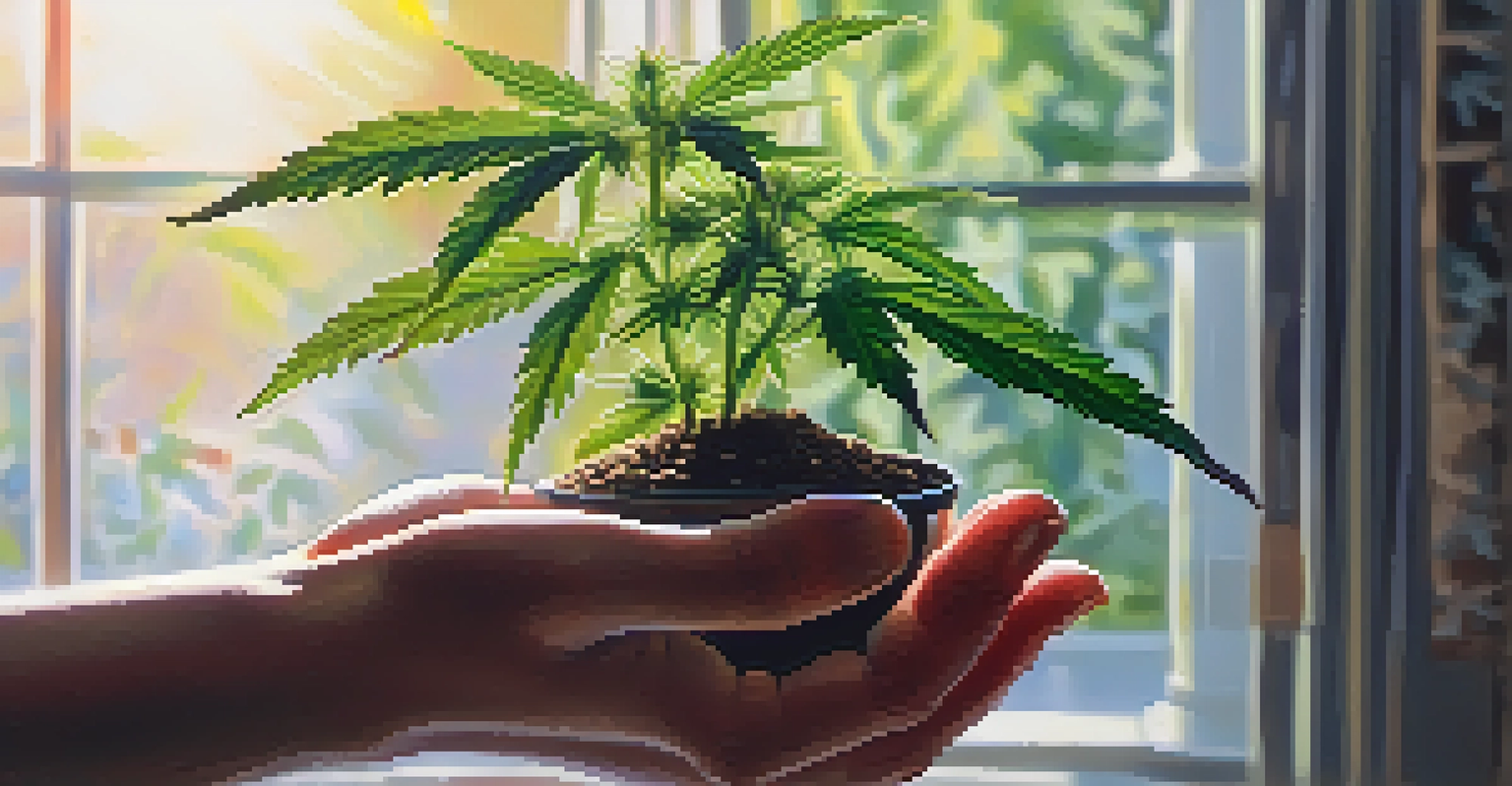PTSD and Marijuana: Can Cannabis Help Manage Symptoms?

Understanding PTSD and Its Impact on Daily Life
Post-Traumatic Stress Disorder (PTSD) is a mental health condition triggered by experiencing or witnessing a traumatic event. It can lead to a range of symptoms, including flashbacks, severe anxiety, and uncontrollable thoughts about the event. For those living with PTSD, everyday life can feel overwhelming and isolating, making it difficult to function normally.
The greatest weapon against stress is our ability to choose one thought over another.
The condition affects not only the individual but also their relationships and overall quality of life. Symptoms can vary greatly from person to person, which complicates treatment options. Many people explore various therapies, including traditional medication and alternative approaches, to find relief.
Related Resource
In recent years, the conversation around using cannabis for PTSD has gained traction, prompting many to wonder if this natural remedy can provide the relief they seek. With growing interest in cannabis, it's essential to explore its potential effectiveness and any associated risks.
The Science Behind Cannabis and PTSD Relief
Cannabis contains compounds called cannabinoids, which interact with the body's endocannabinoid system. This system plays a vital role in regulating mood, memory, and stress responses. Research suggests that cannabinoids, particularly CBD (cannabidiol), may help mitigate some PTSD symptoms by promoting relaxation and reducing anxiety.

Studies have shown that cannabis may help some individuals process traumatic memories more effectively without becoming overwhelmed. This can create a sense of distance from the trauma, allowing for healthier coping mechanisms. However, it's crucial to note that research is still in its early stages, and more extensive studies are needed to draw definitive conclusions.
PTSD Affects Daily Life Significantly
Post-Traumatic Stress Disorder can severely impact an individual's daily functioning and relationships.
Moreover, while some users report positive experiences, cannabis affects everyone differently. Factors such as dosage, strain, and individual health conditions can significantly influence the outcomes, making it essential for users to approach cannabis with caution and awareness.
Potential Benefits of Using Cannabis for PTSD
Many individuals with PTSD have turned to cannabis as a potential way to alleviate their symptoms. Users often report improvements in sleep quality, reduction in anxiety levels, and a decrease in the frequency of flashbacks. For some, cannabis serves as a natural alternative to conventional medications, which can have unwanted side effects.
Trauma is not what happens to you, but what happens inside you as a result of what happens to you.
Additionally, the relaxing properties of certain cannabis strains can help individuals unwind, making it easier to cope with stressors that may trigger PTSD symptoms. This aspect can be particularly appealing for those who have struggled with the side effects of traditional medications.
Related Resource
However, it’s essential to remember that while many find relief through cannabis, it may not be the best option for everyone. Consulting with a healthcare professional is crucial to ensure a safe and informed approach to treatment.
Risks and Considerations When Using Cannabis
Despite its potential benefits, using cannabis for PTSD is not without risks. Some individuals may experience heightened anxiety or paranoia, especially with high THC (tetrahydrocannabinol) strains. This paradoxical effect can intensify symptoms rather than alleviate them, underscoring the importance of choosing the right strain and dosage.
Moreover, reliance on cannabis can lead to other complications, including cannabis use disorder, which can create additional challenges for those already navigating PTSD. It's essential for individuals to monitor their usage and recognize when it may be becoming problematic.
Cannabis Shows Potential for Relief
Cannabinoids in cannabis may help alleviate certain PTSD symptoms, although effects vary by individual.
Lastly, while cannabis may offer relief for some, it should not replace traditional therapies or medications without proper guidance. A comprehensive treatment plan that combines various approaches may yield the best results for managing PTSD.
Legal Status of Cannabis in Treating PTSD
The legal status of cannabis varies widely across different regions, affecting accessibility for individuals seeking treatment for PTSD. In some areas, medical cannabis is permissible for PTSD, while in others, it remains illegal. This discrepancy can create confusion and barriers for those looking to explore cannabis as a potential treatment option.
In regions where medical cannabis is legal, patients often need to obtain a prescription from a healthcare provider. This process can help ensure that individuals receive the appropriate strain and dosage catered to their specific needs. However, navigating the legal landscape can be daunting for many.
Related Resource
Staying informed about local laws and regulations is crucial for anyone considering cannabis for PTSD. As the conversation around cannabis continues to evolve, so too does the potential for more widespread acceptance and research into its benefits.
Personal Stories: Real Experiences with Cannabis and PTSD
Hearing from individuals who have used cannabis to manage their PTSD can provide valuable insights into its effectiveness. Many users share stories of finding relief from debilitating symptoms, allowing them to regain control over their lives. These personal narratives often highlight the varying degrees of success and the importance of finding the right approach.
For example, one veteran shared how a specific strain helped him sleep through the night for the first time in years, drastically improving his daily functioning. Another individual mentioned that while cannabis didn't eliminate her symptoms, it made them more manageable and less intrusive.
Risks and Legalities of Cannabis Use
While cannabis may provide benefits, it also carries risks, and its legal status varies, complicating access for patients.
These anecdotes underscore the subjective nature of cannabis use for PTSD. While some may find it life-changing, others may not experience the same results, pointing to the need for personalized treatment plans.
Moving Forward: Integrating Cannabis into PTSD Treatment Plans
As more individuals explore cannabis as a treatment option for PTSD, integrating it into existing treatment plans becomes increasingly important. Collaboration between healthcare providers and patients can help tailor approaches that prioritize safety and efficacy. This teamwork can ensure that individuals receive comprehensive care that addresses their unique needs.
Furthermore, continued research is essential for understanding the full potential of cannabis in treating PTSD. As studies progress, clearer guidelines can emerge, helping individuals make informed decisions about their treatment options. This knowledge can empower patients to advocate for themselves and navigate their healing journeys.

Ultimately, the goal is to create a balanced approach that combines the benefits of cannabis with traditional therapeutic methods. By fostering open conversations and staying informed, individuals can better navigate the complexities of PTSD treatment.